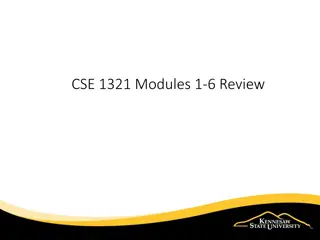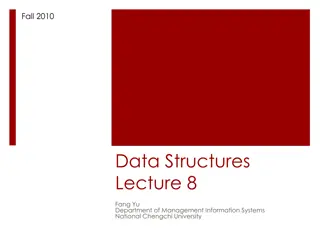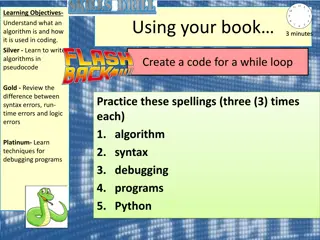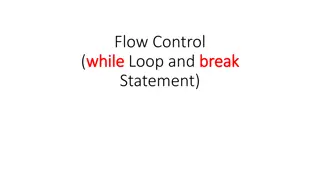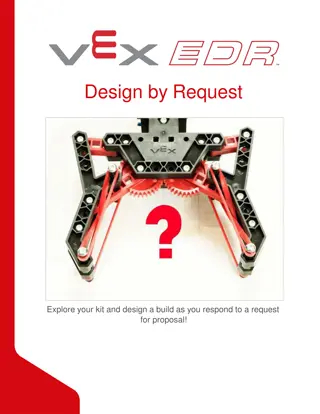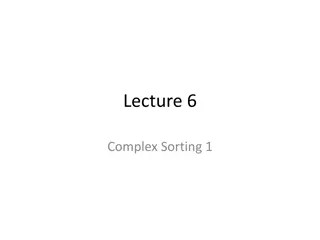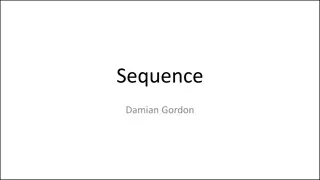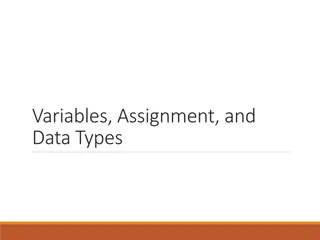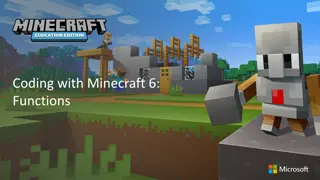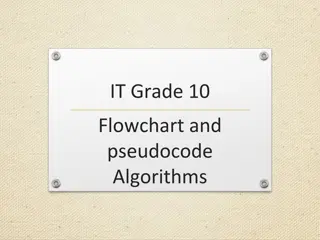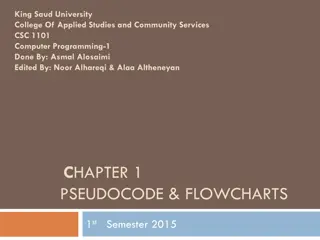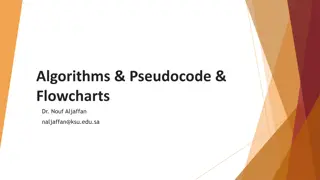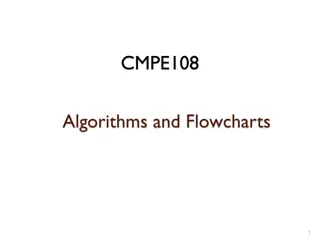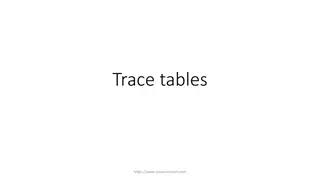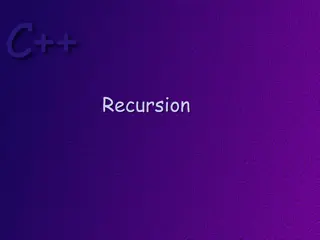Variables, Assignment,and Data Types
Explore key Java programming concepts such as variables, assignment, data types, Java keywords, printing strings, pseudocode, escape sequences, and more. These fundamental topics are essential for building a strong foundation in Java programming. Dive into code examples and explanations to enhance y
8 views • 13 slides
Searching & Sorting Algorithms Overview
Explore various sorting and searching algorithms such as Linear Search, Binary Search, Bubble Sort, Selection Sort, and Insertion Sort. The provided content presents code snippets and explanations for each algorithm, illustrating their implementation in both C++ and generic pseudocode.
1 views • 10 slides
Algorithms and Abstraction Concepts in Programming
Exploring algorithms as logical steps to accomplish tasks and abstraction as a way to group concepts for clarity in programming. Dive into flowcharts for sorting algorithms, pseudocode skeletons, and code snippets in various languages like C#, Java, and C++. Learn about handling variables and user i
4 views • 48 slides
Algorithm Analysis: Key Concepts and Methods
Exploring algorithm analysis through topics like input-output analysis, running time evaluation, experimental studies, limitations, theoretical analysis, pseudocode explanation, and control flow details. Delve into how algorithms perform based on input sizes, types, and different analytical methods
3 views • 35 slides
Learning Objectives and Programming in Python 2.7
Explore the concepts of algorithms, programming in Python 2.7, data types, variables, and error types. Enhance your coding skills by understanding algorithms, writing pseudocode, and practicing debugging techniques. Develop programs using while loops and interactive user input in Python.
0 views • 11 slides
Flow Control with While Loops and Break Statements
Learn about the flow control using while loops and break statements in programming. Explore examples of finding the sum of numbers, creating a loop to stop on user input, and using a break statement to exit a loop. Practice essential concepts through pseudocode algorithms and practical tasks.
1 views • 12 slides
Innovative Kit Exploration and Design Build Proposal
Engage in hands-on builds and programming opportunities using a design kit to respond to requests for proposals. Understand the significance of Requests for Proposal (RFPs), how to organize proposals effectively, maintain detailed engineering notebooks, and plan through pseudocode and flowcharts. Ex
1 views • 38 slides
Comprehensive Overview of Sorting Algorithms in Computer Science
Explore the intricacies of various sorting algorithms like Shell Sort, Merge Sort, and Quicksort through examples, pseudocode, and analysis. Get ready for an upcoming test with sample problems and revision sessions. Don't miss the deadlines for homework submissions and participation. Dive into the w
0 views • 59 slides
Pseudocode and Algorithm Sequences
Pseudocode is a way to represent algorithms using simplified, human-readable code-like language. It helps in outlining the logic of a program without specific syntax. Algorithm sequences are the order in which instructions are executed in a program, typically starting from the beginning and progress
0 views • 14 slides
Introduction to Variables, Assignment, and Data Types in C# Programming
Understanding variables, assignment, and data types is fundamental in programming. In C#, keywords play a crucial role in defining these elements. Learn about printing strings, pseudocode, escape sequences, and more through practical examples in C#.
0 views • 13 slides
Functions in Coding with Minecraft
Functions in coding are self-contained sets of instructions that perform specific tasks within a computer program. They allow for code reuse and save time by writing instructions once as a function and calling it whenever needed. This content covers the purpose of functions, how they save time when
1 views • 30 slides
Algorithms: Flowcharts and Pseudocode in IT Grade 10
Flowcharts and pseudocode are essential tools in programming. A flowchart visually represents algorithms through symbols and shapes, while pseudocode provides a detailed description in natural language. Limiting pseudocode statements to one per line and using proper indentation helps organize progra
0 views • 4 slides
Introduction to Pseudocode and Flowcharts in Computer Programming
Explore the concept of pseudocode and flowcharts in computer programming through a detailed explanation of their use in problem-solving, algorithm development, and program design. Learn how to define a problem, plan a solution, code a program, compile and run it, and test/debug the program effective
3 views • 17 slides
Algorithms, Pseudocode, and Flowcharts in Programming
Learn the fundamental concepts of algorithms, pseudocode, and flowcharts in programming through a series of detailed explanations and visual representations provided by Dr. Nouf Aljaffan. Explore the stages in program development, creating algorithms, computational thinking principles, and the pract
1 views • 20 slides
Software Development Methodologies and Algorithm Design
This content discusses the Software Development Method emphasizing requirements specification, analysis, design, implementation, testing, and maintenance. It also covers algorithms, pseudocode, flowcharts, flowchart symbols, and structured programming techniques like sequence, selection, and repetit
0 views • 36 slides
Trace Tables for Algorithm Testing
Trace tables are a valuable technique used to test algorithms step by step and identify logic errors. They involve using truth tables to track variable values or conditions. This content provides insights into trace tables, correcting errors in pseudocode, using examples for variable tracking, and c
1 views • 9 slides
Recursion in Programming
Explanation of recursion in programming, including objectives, examples, and step-by-step breakdown. Learn how to design functions using recursion to solve problems effectively. Dive into the concept of recursive functions with a practical example of writing digits of an integer vertically. Explore
0 views • 53 slides


